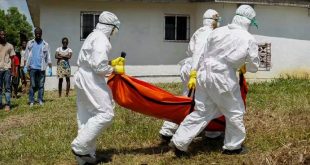
Abuja, Nigeria | Xinhua | Nigerian government on Wednesday destroyed over 1 million doses of COVID-19 vaccine withdrawn from across the country after being identified for having a short shelf life.
The National Primary Health Care Development Agency (NPHCDA), which coordinates vaccination in the country, and the National Agency for Food and Drug Administration and Control monitored the exercise at a dumpsite in a suburb of Abuja, the Nigerian capital.
Faisal Shuaib, head of the NPHCDA, told reporters at the dumpsite that the most populous African country took the decision to join other African nations which earlier destroyed doses of COVID-19 vaccines for the same reason, to boost the confidence of Nigerian citizens in the ongoing vaccination program nationwide.
“We withdrew about 1,066,214, doses of expired AstraZeneca vaccine from across the country,” he said, noting that the doses of vaccine might still be potent before the Nigerian health authorities took the decision to withdraw them.
According to the Nigerian health authorities, the manufacturers of those doses of vaccine offered to extend the shelf life but was declined by the Nigerian government.
“The work that we do is the work that requires trust. It is a sacred trust that has been bestowed on us by the generality of Nigerians,” Shuaib said. “A few months ago, when these vaccines were offered to us, we knew that they had a short shelf life. But we were living in an environment where the supply of COVID-19 vaccines was very scarce.”
The senior public health official said Nigeria still had such short shelf-life vaccines which pose a lot of challenges to the country.
More than 10 million people have been vaccinated so far against COVID-19 in Nigeria, according to Shuaib.
According to media reports in early December, over 1 million COVID-19 vaccines were estimated to have expired in Nigeria in November without being used. And the expired doses were made by AstraZeneca and delivered from Europe.
Nigeria’s health ministry responded quickly and acknowledged some of the vaccine doses which were given by donors had residual shelf lives.
Health Minister Osagie Ehanire explained in a statement that the vaccines which were received in form of donations through COVAX and AVAT facility had residual shelf lives, leaving the country with “a limited period to facilitate distribution and usage.” AVAT, or the African Vaccine Acquisition Trust, which has been launched by the African Union, aims to secure vaccine doses to complement initiatives such as COVAX, the global vaccine equity mechanism, and attain a target immunization of 60 percent of Africa’s population.
Ehanire said the vaccines that expired had been withdrawn and will be destroyed.
The minister said the dilemma is not typical for Nigeria, but a situation many low- and medium-income countries find themselves in. He urged donors “to begin the process early enough and create a well-oiled pathway for prompt shipment and distribution through the COVAX and AVAT facilities, to reduce risk of expiration.”
*****
Xinhua
 The Independent Uganda: You get the Truth we Pay the Price
The Independent Uganda: You get the Truth we Pay the Price



The Government of Nigeria unable to administer the vaccines in time.